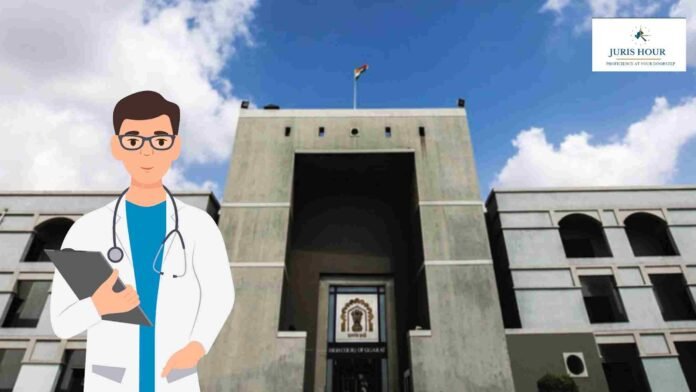The Gujarat High Court has upheld the Rs. 10 lakh penalty against Dr. Bipin Shantilal Panchal, a medical professional convicted in a major narcotics case involving the illicit manufacture and export of Mandrax tablets concealed as pharmaceutical consignments.
The bench of Justice Bhargav D. Karia and Justice Pranav Trivedi delivered the judgment in Tax Appeal No. 870 of 2008, affirming the findings of the Customs, Excise and Service Tax Appellate Tribunal (CESTAT), Mumbai, which had earlier sustained penalties on Dr. Panchal and co-accused individuals for their roles in the narcotics smuggling operation.Home
The Directorate of Revenue Intelligence (DRI), Mumbai, had in 1993 intercepted a consignment of ten cartons declared as “Magnesium Trisilicate U.S.P. Tablets” at the Bombay Airport warehouse, meant for export to Nairobi, Kenya. On detailed examination, five cartons were found to contain light-brown tablets marked with an “M” and a swastik symbol—testing positive for Methaqualone, a psychotropic substance under the Narcotic Drugs and Psychotropic Substances (NDPS) Act, 1985.
Investigations revealed that the exporter, M/s Advance Exports, operated from Ahmedabad under a fictitious name. Statements recorded by the DRI indicated that Dr. Bipin Panchal had supplied the narcotic tablets, which were manufactured at Coral Pharma, Kheda, with assistance from employees of Ruchi Pharmaceuticals, Patan. Subsequent searches led to the seizure of Mandrax tablets and related material from the factory premises.
Dr. Panchal and his associates—Achint Patel, Kashyap Patel, Piyush Pandya, and others—were arrested and charged under the NDPS Act. While two co-accused were acquitted, Dr. Panchal’s conviction was upheld by the Supreme Court in 2006, though his sentence was reduced to the period already undergone—approximately 13 years.
Parallel to the criminal prosecution, the Customs Department issued a show-cause notice in 1997 seeking to impose penalties for attempting to export narcotic drugs concealed as legitimate pharmaceutical products. The Commissioner of Customs, Ahmedabad imposed a ₹10 lakh penalty on Dr. Panchal, ₹30 lakh each on the main conspirators Achint Patel and Bhupendra Bhatia, and ₹5 lakh each on the others.
In 2006, the CESTAT Mumbai dismissed the appeals of Dr. Panchal and his associates, noting that the case was supported by corroborated confessional statements, documentary evidence, and the forensic results confirming the presence of Methaqualone. The tribunal held that the offence amounted to an attempt to export prohibited narcotics under the guise of pharmaceutical tablets.
The High Court examined three key questions of law.
Firstly, whether the Tribunal erred in deciding the case ex parte while the appellant was in jail (1993–2006).
The Bench held that Dr. Panchal was capable of pursuing criminal proceedings up to the Supreme Court during his incarceration, and thus could have taken steps to defend the customs proceedings as well. Hence, no violation of natural justice was found.
Secondly, whether the penalty violated principles of natural justice given the appellant’s long imprisonment.
The Court observed that since the Supreme Court had upheld the conviction, there was no basis to argue denial of justice in confirming the penalty. It emphasized that acquittal was not granted and therefore the customs penalty stood justified.
Lastly, whether the Tribunal erred in relying on the statement of a co-noticee recorded by the DRI.
Referring to the Supreme Court’s 2024 ruling in Commissioner of Customs v. Canon India Pvt. Ltd., the Bench clarified that DRI’s investigative role and reliance on such statements were valid under the Customs Act.
Concluding that all issues stood decided in favour of the department, the Bench ruled that “the appeal being devoid of any merit is accordingly dismissed.”
The High Court reaffirmed that penalties under the Customs Act can coexist with criminal convictions under the NDPS Act for the same factual matrix.
Procedural challenges based on incarceration do not automatically invalidate ex parte customs orders.
Statements recorded by DRI officers under Sections 67 (NDPS Act) and 108 (Customs Act) are admissible and can be relied upon in adjudication.
Case Details
Case Title: Bipin Shantilal Panchal Versus Commissioner Of Customs
Case No.: R/Tax Appeal No. 870 Of 2008
Date: 15/10/2025
Counsel For Petitioner: BHARAT T RAO
Counsel For Respondent: HETVI H SANCHETI
Read More: Gujarat High Court Upholds Customs Penalty Despite Acquittal in NDPS Case

